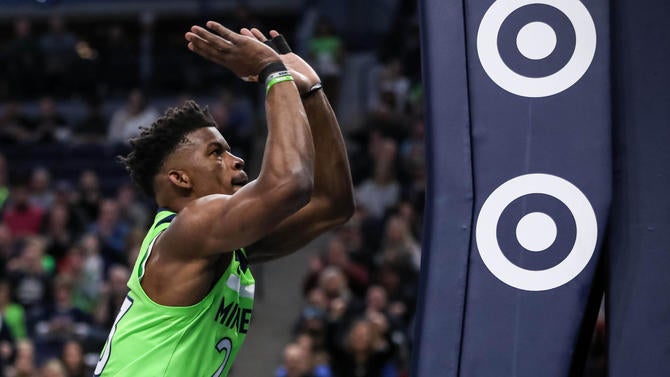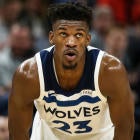MINNEAPOLIS – There is seemingly no other way to look at what has transpired with the Minnesota Timberwolves and erstwhile franchise superstar Jimmy Butler as an unmitigated, Level I disaster.
At least, that's what it is for the immediate future. This was a roster that was constructed to win immediately, a team that hoped to compete toward the top of the stacked Western Conference, a franchise that was sitting in third place last season when a Butler injury caused them to fall to eighth, sneaking into the playoffs by the slimmest of margins.
But looked at a different way – that Butler's trade request could reset the franchise's clock for success for a few years down the road instead of for immediate success – this unmitigated disaster might not be the worst news ever.
In what was either a mighty awkward coincidence or an glimpse behind this franchise's tensions, the worst news of the Timberwolves' year also coincided with the best news of the Timberwolves' year. As the bad news about Butler's trade request percolated just days before the opening of training camp, some good news about the franchise's young cornerstone – 22-year-old Karl-Anthony Towns – signing a five-year supermax extension put another, more optimistic light on the future of this team.
Butler's trade request plus Towns' extension essentially erases last season from the Timberwolves' history. Sure, they still got the franchise's first playoff appearance in 14 years, and a 16-win improvement over the season before. That's worth something for this starving fan base. But the player they traded so many assets for -- two dynamic, though divisive, young guards in Zach LaVine and Kris Dunn, plus the draft rights to versatile young big man Lauri Markkanen -- will soon be gone.
And even though reports came out Monday night that Timberwolves coach and president of basketball operations Tom Thibodeau was still attempting to convince Butler to cancel his trade request and return to the team, Thibodeau told me Tuesday in an exclusive interview for CBS Sports HQ that he plans to honor Butler's trade request. Butler sounds as good as gone.
"Our reality is that he has requested a trade, so we'll honor that," Thibodeau told me. "But we're not just going to make any deal. ... Our conversations (between Butler and Thibodeau) will remain private. He requested a trade and we're going to honor his request. But we're not going to do anything that's bad for the Timberwolves. We're going to do what's good for the Timberwolves. We have to prioritize that. That's what our job is."
Thibodeau's point was the Timberwolves weren't going to be pressured into making a bad deal just because of the timing of Butler's request coming days before training camps began. He believes Butler is a top-10 player in the NBA, and he believes the assets the Timberwolves receive in exchange for Butler should reflect that.
On Tuesday, he also emphasized to me something he told reporters at Monday's media day: If Butler is not traded in the next week, he will be expected to report to the Timberwolves' training camp once his rehabilitation from an offseason hand surgery is complete.
"He's under contract," Thibodeau said. "Who knows? It's a pretty fluid situation. We're always going to do what's best for the Timberwolves. We're going to prioritize that."
Publicly, Thibodeau has remained on message throughout this ordeal. During a 25-minute press conference at Monday's media day, Thibodeau used some variation of the same thought – that the Timberwolves "are not going to be pressured into a bad deal," or that he "must do what's best for the franchise" – no fewer than 15 times.
That can be interpreted two ways: A message to NBA general managers that the Timberwolves won't be trading Butler for pennies on the dollar just because of the less-than-ideal timing. Or a message to Thibodeau's owner, Glen Taylor, that he still wants to keep Butler on the team, especially if no comparable talents are offered in a trade.
But where there's smoke, there's usually fire, and the obvious subtext from the media reports the past several days as well as during the Timberwolves media day on Monday was this: Butler's gone. It's just a matter of when, and what sort of haul the Wolves can get.
Is this a five-alarm fire for the Timberwolves? Absolutely, especially for the near term.
But could this disaster be reframed in a different way – that it's one step backward in order to take two steps forward? Certainly.

This year's Timberwolves roster was constructed to win now. The average age of Timberwolves players on this roster is 27.2 years old, per RealGM.com; that's the sixth-oldest team in the NBA. The average age of last year's Timberwolves roster was 27.3 years old, which was the ninth-oldest team in the NBA. Eight players from this year's roster were acquired as free agents. Thibodeau had hoped this experience would propel the team not just out of the lottery but deep into the playoffs. It was working pretty well last season until Butler's injury.
But the season before last – in 2016-17, Thibodeau's first season with the Timberwolves – the average age on the roster was 25.7 years old, the seventh-youngest team in the NBA. That roster was built in-house, not from free agency. Nine players on that team were acquired through the draft and draft trades. The last team to have more players on its roster acquired through the draft or draft trades was the 2012-13 Portland Trail Blazers with 10.
What Butler's trade request could do to the Timberwolves is reset the clock to a similar timeline the Timberwolves were looking at during the 2016-17 season. That makes the original Butler trade a sunk cost, but the sunk cost that was last season also included valuable playoff experience for Towns and other youngsters like Andrew Wiggins and Tyus Jones.
"We want them to carry that forward," Thibodeau told me Tuesday.
So is it really so bad for the Timberwolves that Butler requested this trade, crappy timing and all?
Sorry, but the Timberwolves weren't going to win a conference title this season no matter what Butler did and no matter how much Towns and Wiggins improved. That'll be the Golden State Warriors (or the Houston Rockets or, hell, the Los Angeles Lakers -- never doubt LeBron James). What Butler's trade does is reset this franchise's clock around the development of two youngsters: Towns, who last season was an All-Star and All-NBA player, and Wiggins, who still has an enormous amount of talent despite the frustrating results. Kicking the can down the road, when Towns and perhaps Wiggins are both reaching their prime, likely means a few things: The Golden State Warriors will no longer be dominating the league, Father Time will finally start to catch up with James, and rest of the league's active MVP winners will be well into their 30s (with Dirk Nowitzki presumably retired).
Plus, Butler had clearly come to the conclusion that he didn't envision his future with this franchise. He wasn't going to sign with the Timberwolves this coming offseason when he's an unrestricted free agent. Perhaps the Timberwolves can gain some useful young talent for Butler now instead of losing him for nothing in free agency.
The timing is never good when a player requests a trade. Thibodeau said that during Monday's media day. I brought up to him Tuesday that the timing of Butler's trade request seemed especially bad.
Thibodeau put on an optimistic face.
"We don't get distracted," he said. "That's the important thing. In the NBA things always change, whether it's a trade request, an injury -- it could be a lot of different things. You have to be ready to go. Don't allow yourself to be distracted. That's the important thing."
Of course he'll say something like that. The obvious way to look at the Timberwolves current situation is that it's a franchise disaster. He's trying to put a happier face on something that's pretty embarrassing, that his guy – the guy he moved mountains to acquire barely a year ago – is requesting a trade.
But there's an optimistic way to look at this situation as well, and a way that isn't naïve and Pollyannish. Days after one of the franchise's star players requested a trade, the franchise was able to lock up another star – the younger of the two stars, and the type of player NBA teams tank for entire seasons in order to have a chance to draft – for five more seasons after this one.
It's not what anyone in this organization would have asked for at the end of last season. But depending how things go in the coming weeks and months, it could be a blessing in disguise.


















